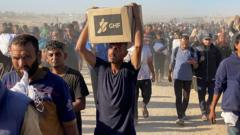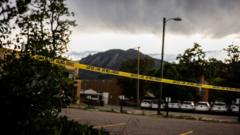Authorities reveal the details surrounding the attack, raising concerns about national security and immigration enforcement.
Boulder Attack Suspect: Egyptian National in the U.S. Illegally, Murder Charges Filed

Boulder Attack Suspect: Egyptian National in the U.S. Illegally, Murder Charges Filed
The suspect behind the Boulder attack is confirmed to have overstayed his visa while eight people remain hospitalized with serious injuries.
In a distressing incident that has left the community reeling, the Department of Homeland Security (DHS) has confirmed that the suspect in the Boulder, Colorado attack, which targeted supporters of Israeli hostages in Gaza, is an Egyptian national residing in the U.S. illegally. Mohamed Sabry Soliman, 45, entered the United States on a tourist visa in August 2022, only to let that visa expire in February 2023. He attempted to file for asylum shortly after his arrival but has remained without legal status since.
The attack, described by authorities as an act of terrorism, took place during a peaceful march and involved a makeshift flamethrower, resulting in burns and other serious injuries to eight individuals. Two of the injured were reported to be in critical condition. Soliman was apprehended soon after the attack, with witnesses providing crucial identification leading to his arrest.
Following his capture, he was booked into the Boulder County Jail, facing several charges, including first-degree murder. Officials have not reported any fatalities among the injured, although the situation remains precarious.
A spokesperson for DHS noted that Soliman's illegal status raised significant concerns, especially given his previous asylum filing. The National Counterterrorism Center shared this information with federal law enforcement, although there was no prior derogatory intelligence regarding him before the incident.
Community leaders are now questioning how individuals on expired visas can pose threats without effective monitoring, highlighting a growing debate over immigration policies and security measures in the U.S.



















